
Related
Guests
- Patti Smithsinger-songwriter, poet, artist and punk rock legend. Her memoir “Just Kids” has just been awarded the National Book Award.
The singer-songwriter, poet, artist and punk rock legend Patti Smith has won the National Book Award in the non-fiction category for memoir, Just Kids. The book tells the story of Smith’s coming of age in New York City and her lifelong friendship and creative collaboration with the renowned photographer Robert Mapplethorpe. We interviewed Patti Smith earlier this year. [includes rush transcript]
Click here for the extended interview with Patti Smith.
Transcript
AMY GOODMAN: Punk rock legend Patti Smith, singing an a capella version of her best-known song “Because the Night” here in our studios. She did it just a few months ago, when we dedicated our new broadcast studios, the greenest in the country. She was with us with hundreds of people celebrating.
Well, on Wednesday, Patti Smith was awarded the National Book Award in the nonfiction category for her memoir Just Kids. The book tells the story of Smith’s coming of age in New York and her lifelong friendship and creative collaboration with the renowned photographer Robert Mapplethorpe. Patti Smith’s influential debut album Horses came out in 1975 to critical acclaim.
Her best-known song “Because the Night” was co-written with Bruce Springsteen. More recently, Patti has performed in numerous antiwar rallies. She’s written songs about American peace activist Rachel Corrie, the Israeli assault on the Lebanese village of Qana, and Murat Kurnaz, a Turkish citizen of Germany who was imprisoned at Guantánamo for five years.
Well, Patti Smith joined us in the studio and spoke with Anjali Kamat and I about her life, her art, her activism and the focus of her memoir, her friendship with Robert Mapplethorpe.
PATTI SMITH: Well, I met Robert in 1967. Again, you know, I came to New York with nothing. I had a lot of bravado. I had a few dollars in my pocket, but I had a good work ethic. I knew I wanted a job, and that’s what I was looking for. And I also didn’t feel any fear in New York City. I really loved New York. I was brought up in a very rural community, and we didn’t have cars. The roads were dark. There was nowhere to go. You’d have to walk like four or five miles to, you know, go to a pizza place. And, you know, New York, where everything was right there, there was all kinds of places to get coffee, you could sleep on the subway. You know, it seemed like the safest place in the world.
So, and in the middle of this atmosphere, I met Robert, quite accidentally. And we were both quite — we were more alike than not. We were the same age, both wanted to be artists, both had nothing, and both sort of on the fringe of things. You know, both of us were more the late bloomer type. And, you know, despite the fact that Robert was — you know, had a very engaging face, he was still sort of a wall flower, a person on the fringe, even in an art school. So we gravitated toward each other and supported each other and evolved together and went through all kinds of things, you know, from Robert discovering or coming to terms with his evolving sexual identity to becoming a photographer, me evolving from poetry into rock-and-roll. And we evolved together.
ANJALI KAMAT: And he took the iconic photograph of you on the cover of your first album?
PATTI SMITH: Yeah, he did. He did. And we did that just like we did everything else. Our relationship was built on trust. And, you know, sometimes people ask me about how we took this picture, like it was some big drama. Like now, you get your picture taken and the photo shoot, that you’d think they were doing a movie. There’s like catering and, you know, four monitors and a bunch of people running around. It’s like a Peter Sellers movie, you know. Really, it was just me and Robert, you know, in a white room and with natural light. In fact, his light meter was broken, so he took twelve shots, and we got it.
AMY GOODMAN: You know, the geography of this city tells so many stories, and Democracy Now! has just moved from this hundred-year-old firehouse. Our dear friend — who could think you’re calling your landlords your friends, but Keiko Tsuno and Jon Alpert, I hope they’re here tonight. I’m not sure if they are, but really embraced us and protected us, until we outgrew this firehouse, because they were growing, as well, Downtown Community Media Center. And so we ended up here in Chelsea, just around the corner from the Chelsea Hotel.
PATTI SMITH: Yeah, yes.
AMY GOODMAN: So talk about 1969 and you and Robert going there.
PATTI SMITH: Well, first of all, I just want to say that there’s nothing better than to be able to say that you had to move because democracy was growing, so…
But Robert and I were both —- we went through a lot of different things. And in 1969, we were a bit down on our luck, and we had heard that if you went to the Chelsea Hotel, they would often trade art for a room. And we went to the Chelsea Hotel, and I checked out the lobby, and the stuff was pretty bad, and I thought, oh, we won’t have any problem. But Mr. Bard was not really interested in our work, but he was interested in the fact that I had employment, which was something that probably 70 percent of the people of the hotel did not have, so -—
AMY GOODMAN: Who was there?
PATTI SMITH: Who was there at the time? Well, the first person we met in the lobby was Harry Smith, who was definitely not employed. But we saw all kinds of people there. I mean, there was a lot of artists and writers. Virgil Thomson lived there. I’d say Shirley Clarke. I saw Jonas Mekus there a lot and Allen Ginsberg and just about — I mean, we could go on and on with lists of people. Even Arthur C. Clarke lived there.
So I talked Mr. Bard into, you know, letting us have a room based on the fact that I had a job. We had the smallest room in the hotel, which doesn’t even exist anymore. It had no bathroom. It was $55 a week, and I made $65 at Scribner’s Bookstore. So that pretty much could say what our living situation was. But it was really a great stroke of luck to move at the Chelsea, because the people that we met there — Gregory Corso and William Burroughs and Allen Ginsberg. I met Bobby Neuwirth and so many musicians, people you never heard of and people who, you know, we all revere. And I think I said it in the book, but it’s true, it became my new university. I couldn’t think of a better place to be at the time, because I learned so much about everything, about painting and poetry, performance, activism, all in this one hotel.
AMY GOODMAN: Two years later, 1971, talk about putting poetry to music.
PATTI SMITH: Well — sorry. Well, I had my first poetry reading. It was on Bertolt Brecht’s birthday, February 10th, 1971. It was a full moon. I was opening up Gerard Malanga at St. Mark’s Church. And, of course, St. Mark’s Church was, you know, the Mecca for poets at the time. And it was quite an honor to get eighteen minutes at St. Mark’s Church. So I really wanted to do something special, and also I knew Gregory Corso really good, and he would really harass you if you were boring. I mean, he would sit in the back, way back there, and if you were boring, you could hear him all the way from back there letting you know that you were really boring. And so, I asked Lenny Kaye to play some interpretive electric guitar, a little feedback, to some of — to certain of the poems. And I didn’t think much about it. I just thought, you know, it was sort of like Kerouac and Steve Allen playing together. It’s just only with electric guitar. But it seemed to cause a bit of a stir, and I guess that’s how it began. Still stirring.
ANJALI KAMAT: You talked a little bit about your activism. Some of your more recent music is also — sort of builds on these themes. And you had a song called “Qana,” a song about a detainee who was in Guantánamo. Can you talk a little bit about these songs?
PATTI SMITH: Well, I mean, I would never call myself an activist ever. I don’t really — I mean, I hope that I’m a humanist and sort of a good citizen. I really think of the people who are out there in the front lines every day, and I’m so grateful to all of you. I’m sort of — I think of activism on many levels — the people that are out in the trenches and then citizens who can do just small things, the smallest things. And one of the things that I can do is respond to things that are unjust or — and hopefully by putting it out into the world, free, putting it on websites, these songs, maybe it will be of good use.
The song that she was talking about, about Guantánamo Bay, I wrote in response to Murat Kurnaz. He was a boy the same age as my son. And he was detained for suspicious travel. He was German and Muslim, which made him very suspicious after September 11th, and wound up in Guantánamo Bay without any real charges, just a comedy of — or not a very — like a very black comedy of errors brought this boy for like five years, chained, in a very small room, never with the lights out. He had lights on twenty-four hours a day. He couldn’t really lay his whole body down on the floor, because his cell was too small. And he stayed there for five years. And when they finally did get him out, when he was finally released, he was put on a plane, chained to the floor, with soldiers surrounding him with machine guns, or guns. And that was his first taste of freedom. And because he’s the same age as my — well, because he’s a human being, but also, as a mother, I was so horrified by this, imagining, projecting that if this was my son, and so I wrote the song “Without Chains.” The gist of the song is it tells his story, but it says in the end, “They say I walk strange,” because he’s walking — when he greets his parents, they finally take the chains off, and he fell to the ground, because he wasn’t used to not having chains. And the song talks about how he now has to learn to love without chains, vote without chains, dance without chains, breathe without chains.
AMY GOODMAN: Patti Smith, punk rocker, now National Book Award winner. You can go to our website for the full interview.

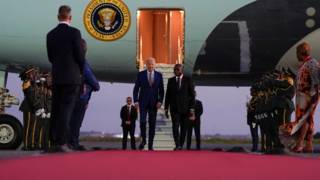

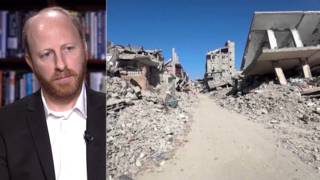
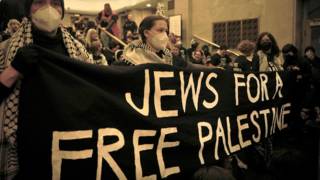





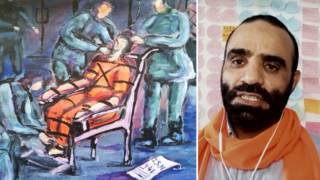
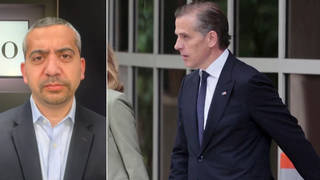
Media Options